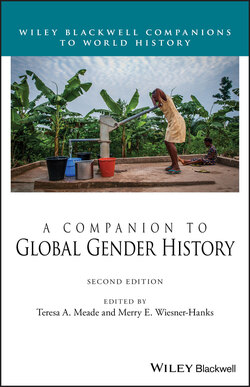Читать книгу A Companion to Global Gender History - Группа авторов - Страница 38
Maintaining Gender in and through Mythology
ОглавлениеIf the ritual cutting of genitals marked the gender and heteronormativity of the body of initiates, mythology abstracts the material practices of ritual. There are no direct myths among the Mende concerning the foundation of circumcision or the necessity to circumcise children, as one finds in the Tanakh and the commandment of deity to Abram that he circumcise himself and all those males associated with him as part of his covenant with deity. In order to walk before YHWH and “be perfect,” Abram must circumcise himself after which deity gives him a new name, Abraham. Having performed his own circumcision, Abraham was then able to impregnate Sarai, whose name was changed to Sarah (Genesis 17). That said, the conceptualization of perfection and the promise of reproduction in light of male circumcision proposed in the narrative is quite similar to the Mende conceptualization of circumcision. Among the Mende there is an understanding that there was/is a need to bring that which is taken to be in a state of nature, children, and move them into a state of culture, so that they can join Mende society. This shift from a state of nature to a state of culture, from the raw to the cooked (Lévi‐Strauss, 1970), acts in concert with the Mende mythology of the bush as nature par excellence that must be clear cut in order to produce rice, a Mende staple, and other crops such as beans and cassava (Ferme, 2001: 40–47). Like the clearing of the chaotic bush so that it may properly produce, children’s genitals were also clear cut ensuring they might properly produce. As Donald Cosentino wrote: “The worlds of the town and the bush define the limits of the Mende Cosmos. They exist as two poles in absolute opposition – town : bush :: nature : culture :: known : unknown :: human : unhuman” (1982: 25). Fuambai Ahmadu, following Carol MacCormack (1979), also writes that:
Like other areas that fall into the category of “nature,” such as the “bush” or forest before being cleared to be “tamed” and “made” into productive farmland, children must be “made” into either “male” or “female” depending on the appearance of their genitalia at birth, in order for them to be able to reproduce and become part of the world of culture.
(2000: 296–7)
Among the Mende the “bush” is a site of power, and the location of the spirits whose powers can help or hinder Mende folk. Cosentino writes that the bush is the “home of the unhuman and anti‐human” made up of ancestors called ndebla and bush spirits or genii called jinanga (1982: 25). In the bush can be found powerful medicines, called hale, that are used by the Poro and Sande as part of their ritual and medicinal practices. In the Mende system of belief and practice, hale is medicine derived from residual power imbued into existence by the creator deity Ngewo, also called Leve. As Kenneth Little wrote, “He [Ngewo] invested the whole universe with a certain non‐material kind of power or influence, which manifests itself in various ways and on specific occasions in human beings and animals and even in natural phenomena such as lightning, waterfalls and mountains” (Little, 1967: 218). Although Ngewo removed himself to the sky, he can be reached through the spirits of the ancestors, the bush and also the spirits associated with Poro and Sande called the ngafa. These were spirits brought into existence by Ngewo at the outset of creation (Little, 1967: 216–26) and as the ngafa of the Sande and Poro were brought into existence at the outset of time, so too were the Sande and Poro people. Although it is not possible to historically date the foundation of the Sande and Poro societies, female and male initiation societies in Sierra Leone are mentioned as early as the fifteenth century (Grillo, 2018: 106). What the Mende say about Sande is that “they have had a Sande for a long, long time” (Grillo, 2018) or “it has always been there” (MacCormack, 1979: 27).
